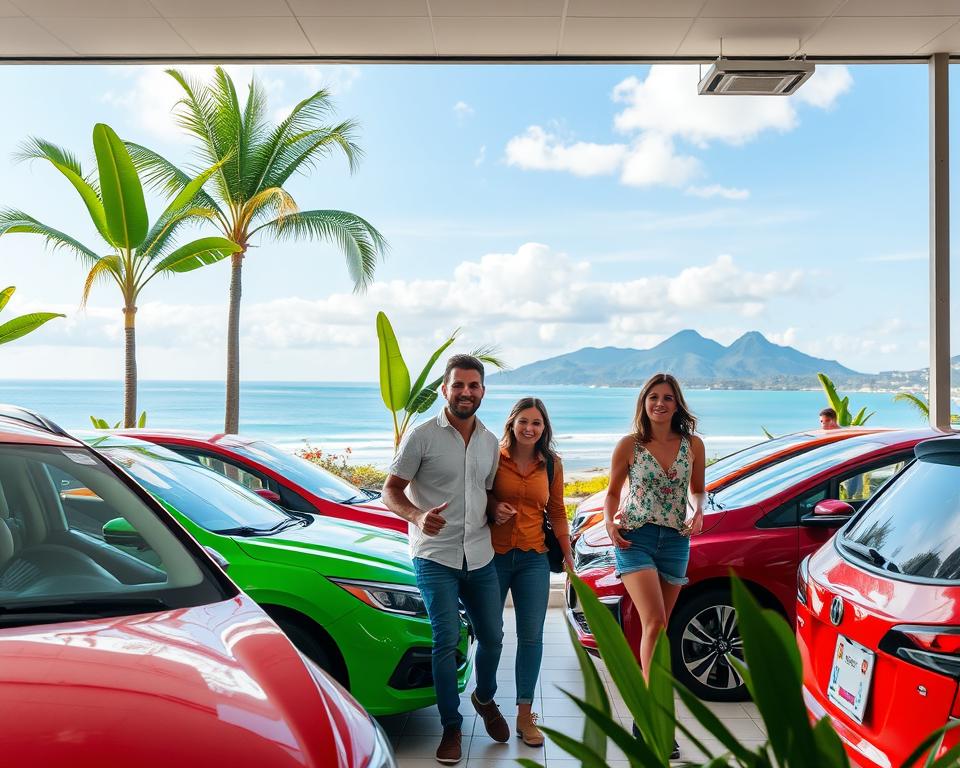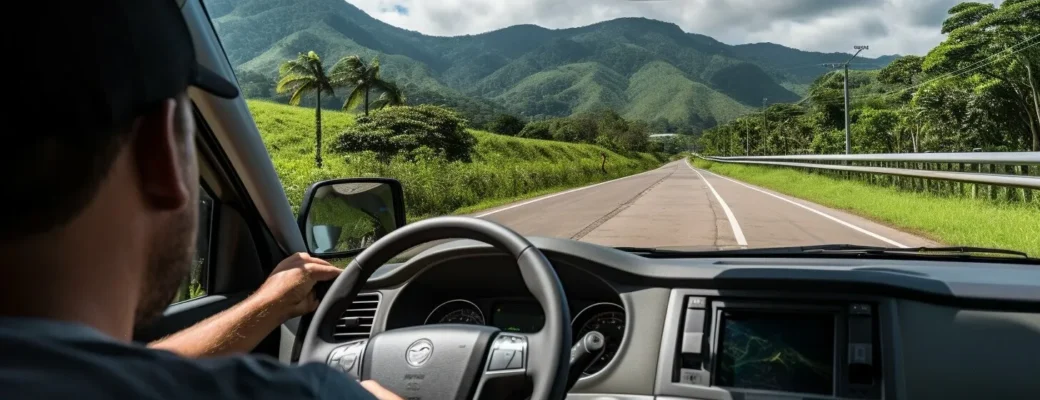Essential Guide to Buying a Car in Costa Rica And What You Need To Know
Are you ready for the surprises of buying a car in Costa Rica? High import taxes and a unique market can change your budget a lot. This guide will help you understand the car buying process. It’s packed with tips to make sure you make the right choice.
Gap Real Estate has over 20 years of experience in Costa Rica. They know how important it is to get the car market. Import duties can be 50% to 80% of a car’s price. Knowing this can help you plan your budget better.
Key Takeaways
- Understanding the implications of hefty import taxes that can inflate vehicle prices by 25-50% compared to the US.
- The significance of local legal and financial considerations, including notary fees and annual registration costs.
- Being aware of market dynamics that could affect your vehicle choices, including popular brands like Toyota and Honda.
- Exploring financing options available in Costa Rica, including dealership offers and bank loans.
- The necessity of thoroughly inspecting used cars to avoid common pitfalls such as odometer tampering.
Introduction to Car Buying in Costa Rica
When you start looking to buy a car in Costa Rica, you need to know a few things. Owning a car is key for getting around, since public transport isn’t always reliable. It’s important to understand what you need to own a car before you buy.
The car market in Costa Rica is strong. But, importing a used car can be pricey, with duties ranging from 52% to 79% of the car’s value. Shipping a car from the US adds another $500 to $800 to the cost.
For expats, owning a car can be a good deal. For example, a 2003 Mitsubishi Lancer bought for $17,500 in the US might sell for $12,500 in Costa Rica. But, finding parts for foreign cars can be tricky, and some might need to be ordered.
It’s also important to know about local rules, like the vehicle inspection at Riteve, which costs about $18. Older cars might need repairs, which could cost around $725 over ten months. Knowing this helps you make a better choice when buying a car.
Understanding the Costa Rica Car Market
The Costa Rica car market has its own set of trends. These trends are shaped by the balance between new and used cars. Import taxes can make cars 50% to 80% more expensive than in the US.
Because of this, many people choose used cars. They are more affordable. The average person spends $8,000 to $10,000 on a car, making used cars a good option.
Compact SUVs are the most popular in Costa Rica. Models like the Toyota RAV4 and Honda CR-V are favorites. They are reliable, fuel-efficient, and easy to maintain.
Websites like CR Autos and Encuentra24 are key for finding cars in Costa Rica. Buying a car often involves negotiating prices. For older cars, it’s wise to get a mechanic’s check before buying.
Buying a car also means dealing with legal fees for title transfer. The cost can be between $300 and $500, depending on the car’s value. Understanding the market’s costs and trends is key to making a smart choice.
About Buying a Car in Costa Rica
Buying a car in Costa Rica has its perks, mainly for those looking at used cars. Knowing these benefits helps you make smart choices in the car market.
The Benefits of Buying Locally
Buying a car locally comes with many advantages. Dealerships often have brands like Toyota and Honda, known for being reliable and easy to maintain. Local service centers make it easy to find original parts and filters, helping your car last longer.
Choosing a used car locally can also save you money on maintenance. Local tires from Bridgestone are about 50% cheaper than dealer prices.
Considerations for Foreign Buyers
Foreign buyers in Costa Rica face some challenges. Language barriers can make talking to sellers and service people hard. Also, not knowing local laws can complicate the buying process.
It’s important for these buyers to understand import duties, which can be 50% to 80% of the car’s value. Websites like CR Autos and Encuentra24 can help find the right car, whether from dealers or private sellers.
Steps to Navigate the Car Buying Process in Costa Rica
Buying a car in Costa Rica requires careful planning and informed choices. Knowing how to set a budget and finding the right vehicle is key. This makes the car buying experience better.
Setting a Budget for Your Purchase
First, you need to set a budget for buying a car in Costa Rica. This budget should cover all costs. This includes:
- The vehicle’s purchase price
- Taxes, which range from 1.5% to 3% of the vehicle’s fiscal value
- Insurance costs, often crucial given the rising demand for comprehensive coverage among buyers
- Annual fees and taxes, averaging 15% of the vehicle’s value
Having a detailed financial plan helps avoid surprises. You can also use currency conversions to understand costs better.
Finding Your Ideal Vehicle
Finding a car that fits your needs is crucial. Websites like CRAutos.com and Encuentra24 have many options. Many choose compact SUVs, which are popular in the used car market.
The area around Grecia is known for its used car market. It offers many choices. Getting pre-approval from WheelsCR lets you test drive cars without pressure. This helps you make a confident choice.
Teams like WheelsCR are known for clear communication. This ensures buyers are well-informed. Remember to negotiate for features and add-ons, like warranties and service packages.

Legal Requirements for Purchasing a Vehicle
Buying a car in Costa Rica has its own set of rules, which are crucial for foreign buyers. The process includes several key steps. These steps ensure the car’s ownership is verified and protect the buyer from future problems. It’s important to work with a notary public to make sure all documents follow Costa Rican laws.
Necessary Documentation for Foreigners
Foreigners need specific documents to buy a car. Here are the main ones:
- Proof of identity, like a valid passport.
- Residency documents, which can be hard to get for 60% of expats.
- A tax identification number (Número de identificación tributaria, or NIT).
- A bill of sale with all the necessary details to avoid scams.
Buying from a dealership might require more documents. You’ll also need a valid international driver’s license for up to three months. Getting help from local legal services is a good idea to make sure you have everything you need.
Understanding Registration and Insurance
Registering your vehicle in Costa Rica is a formal step that confirms ownership. About 95% of these transfers happen through notaries, ensuring everything is legal. The cost includes taxes and stamps, which are about 3.5% of the car’s value.
Insurance is also key for car owners. In Costa Rica, 65% of cars have mandatory liability insurance. It’s wise to consider extra insurance, as only 30% get comprehensive coverage. Good insurance helps protect against unexpected events and follows local laws. For more information, check out getting a driver’s license in Costa Rica.
Best Practices for Buying a Used Car
When looking to buy a used car in Costa Rica, focus on two key areas: a detailed vehicle inspection and getting vehicle history reports. The used car market can be tricky, so it’s important to be careful. A thorough check can uncover hidden problems.
Inspecting the Vehicle Thoroughly
A detailed vehicle inspection is crucial. Here’s what buyers should do:
- Look for rust, dents, or paint issues on the outside.
- Check the tires and brakes for safety.
- Inspect the inside for wear and make sure electronics work.
- Have a mechanic look for mechanical problems.
These steps help find current issues and can lead to better price talks. Being proactive can save you from costly repairs later.
Vehicle History Reports: Importance and Availability
Getting vehicle history reports is essential before buying. These reports give you important info, like:
- Accident history
- Title status
- Odometer readings to spot tampering
Knowing about odometer tampering can save you a lot of money. Services like CARFAX or AutoCheck provide these reports. They help you understand the car’s past, making your decision easier.
Financing Options for Buying a Car
When looking to finance a car in Costa Rica, buyers have many choices. Each option affects the cost and ease of getting a vehicle. It’s key to look at all financing methods to find the best fit.
Exploring Dealership Financing
Dealership financing is a popular choice. Dealers offer loans that match what customers need. These loans have interest rates from 12% to 16%.
Loans start at $50,000 and go up to $5,000,000. Terms range from 6 months to 3 years. This makes it easy to get a loan, but it’s important to negotiate well.
Dealership financing might include extra costs like notary fees. So, it’s important to look at all the costs before deciding.
Understanding Bank Loans and Alternative Options
Bank loans are another option for car financing in Costa Rica. Banks like Commercial Bank A offer rates from 13% to 18%. Loans range from $25,000 to $1,000,000, with terms from 1 to 5 years.
Private Lender B offers different rates and terms. They have rates from 14% to 20% for loans from $75,000 to $2,500,000. Terms can be from 6 months to 2 years.
Expats should look at all financing options. Sometimes, bank loans are better than dealership financing. It’s important to compare rates and terms to get the best deal
Ongoing Costs and Maintenance Considerations
Buying a car in Costa Rica is more than just the first payment. Car owners must also think about ongoing costs like maintenance, insurance, and registration fees. Knowing these costs helps give a clear picture of what owning a car really costs.
Regular Maintenance Expenses
Keeping your car in good shape is key. This includes regular checks like oil changes and tire rotations. Local shops use the best parts and oils to keep your car running well.
How much you’ll spend on maintenance each year depends on your car’s make and model. It’s smart to set aside money for these expenses to manage your budget better.
Insurance and Registration Fees
Insurance and registration fees are big parts of car ownership costs in Costa Rica. The Marchamo, which includes insurance, must be renewed every year. The cost is based on your car’s value.
Registration and taxes usually cost 5-7% of the car’s price. Knowing about these fees helps avoid surprises and helps with budgeting.
Conclusion
Buying a car in Costa Rica needs careful planning and attention. Buyers should research local laws, financial needs, and the market well. The role of a notary public in buying a car is as important as in real estate.
It’s also key to know the extra costs and taxes of owning a car. For example, registration can cost about 3.5% of the car’s value.
Seeking legal advice before buying is crucial. Scams and false information are common, so expert help is very important. Knowing about notary fees and import taxes is essential for a smart buy.
While buying a car in Costa Rica might seem hard, it’s doable with the right info and planning. Following the legal steps can help avoid problems. This guide aims to help buyers feel confident and ready for their new car.




